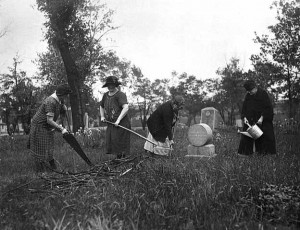
Members of the Minneapolis Cemetery Protective Association”'s Ladies Auxiliary sprucing up the cemetery in the Spring of 1926. The cemetery will reopen on April 15th, 2010.
by Susan Hunter Weir
Squire Borden was born on the Atlantic Ocean on August 25, 1823. Perhaps that explains his life-long attraction to water. For many years, he worked as the bridge-tender on the first two suspension bridges that spanned the Mississippi River in Minneapolis, and since everyone who crossed the bridge encountered him, his was one of the most familiar faces in the city.
In 1854, local entrepreneurs paid for the first bridge in the country to span the Mississippi River. The bridge was made of wood, and the cost of operating it was initially covered by tolls (two cents for a pedestrian and 25 cents for a wagon). Twenty years after it was built, the bridge was in poor condition and too narrow to accommodate the number of wagons that needed to cross it. The City contracted with Thomas M. Griffith, a nationally-known engineer, to build a replacement.
The second bridge, 675 feet long and 32 feet wide, was constructed of steel and concrete rather than wood. It was thought to be an engineering marvel and crowds gathered along the riverbanks every day to watch construction workers string the cables from one side of the river to the other. Local boosters claimed that this new wonder would last for at least half-a-century, but it lasted only 24 years.
During the declining years of the first bridge and the first six years of its replacement, it was Squire Borden”'s job to monitor the condition of the bridge and to assist those who needed help crossing it. It was steady job but one that was not without its hazards. In July 1877, Mr. Borden was underneath a wagon that had broken down on the bridge. The load of lumber that the wagon was carrying slipped and fell on him. The Tribune reported that the “crush”¦was not fatal or even dangerous, but it was mighty painful.” In May 1881, the Tribune reported that “a drunken individual assaulted Squire Borden”¦but before any blood was spilled a police [sic] yanked the offender to the lock-up.”
Squire Borden”'s unusual first name suggests that his parents had high hopes for their son. There are several definitions of “squire,” but the one most commonly used refers to English country gentlemen or large landholders. It is unlikely that his family owned any substantial amount of land (or any at all) in England. If they had, they would not have emigrated and had a son who would later boast that he was born on the ocean.
Squire Borden continued the family”'s practice of giving their children lofty names. He named his third child after a Civil War naval officer and hero, Admiral David Farragut, who won the Battle of Mobile Bay in 1864 and who is famously known for having commanded his men to “Damn the torpedoes, full speed ahead.” Apparently, having a five-year-old named Admiral running around the house was a little daunting even for Squire; in the 1880 census Admiral Farragut Borden was identified as Eddie.
Squire Borden died in 1881 at the age of 59 from an enlarged heart. He is buried in Lot 5, Block N. His widow, Gertrude, and their four children moved to Los Angeles. If his father had hoped that Admiral Farragut Borden would some day go to sea, that never happened”“Admiral Farragut Borden worked as a florist in Los Angeles.










[…] of the only existing texts to provide Latinate translations from the Aztec language”!) The Alley Newspaper revered Squire Borden, historical local bridge-tender. (He named his son […]